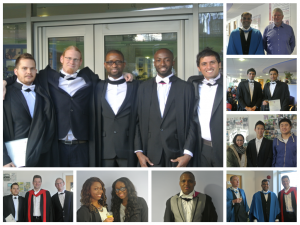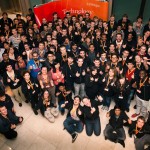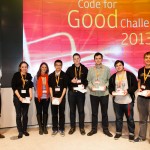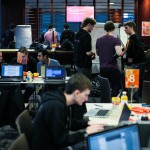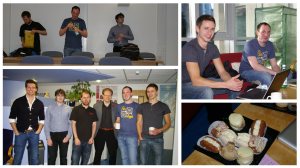Congratulations to the Masters Class of 2013, and PhD student Galhenage Perera, who graduated today. Students were invited to a reception in the school to celebrate their achievement with staff, friends and family. Our graduates have moved on to a wide variety of interesting and challenging employment and further study opportunities, and we wish them all well with their future careers.
Month: November 2013
Industrial Action Next Week
Dear Students,
As you probably know, all three main University trades unions have called for a second strike day on 3 December. Since it’s revision period, not much teaching is scheduled for that day. If you do have a revision tutorial, catch-up lecture or meeting with your supervisor scheduled, we would expect it to go ahead. Unless you hear definitely that it is not happening, please turn up on time as usual.
We can confirm that the Jack Cole and John Honey buildings will be open. Adequate safety cover, including first aiders and fire marshals will be in place.
Steve Linton, Head of School
Sapere project comes to a successful end
Over the past three years the School has been involved in the Sapere project, funded by the European Commission. Sapere has been looking at new ways to build large-scale pervasive systems, moving away from traditional client/server approaches to explore biochemically-inspired system models in which services and users can “bond” spontaneously as they encounter each other in the real world. Sapere was co-ordinated by the University of Modena Reggio Emilia and — as well as St Andrews — involved the University of Bologna, University of Geneva, and Johannes Kepler University of Linz. Sapere had its final review this week and was ranked as “excellent … the project has even exceeded expectations”.
The project achieved considerable visibility by being deployed at the Vienna City Marathon to provide services including runner tracking and guiding spectators to possible viewing opportunities. The deployment had several thousands users downloading and using a smartphone app throughout the event, as well as several large attention-sensing public displays that responded directly to people stopping to look at them.
The scientific highlights of Sapere include developing a formal model of spontaneous interactions; building a middleware platform based on these ideas; developing a catalogue of useful patterns that describe co-ordinated interactions at a high level; and creating several exciting new algorithms for context awareness and situation recognition. This last activity was led from St Andrews by Simon Dobson, Juan Ye, and Graeme Stevenson, and allowed us to recognise activities going on in “busy” spaces where multiple things are happening simultaneously — a problem that has been extremely resistant to solution until now.
Sapere shows that pervasive systems are now “ready for prime time,” and that even research that seems highly speculative and challenging can lead to results that affect people’s lives directly. We’ve thoroughly enjoyed working with our collaborators, and we’ll certainly be looking to take these ideas forward in new projects and directions.
Here’s a non-technical overview video introducing Sapere:
Success in J.P.Morgan Code for Good Competition 2013
A team of Computer Science students from the University of St Andrews came first in the J.P.Morgan Code for Good Competition 2013
The Coding Challenge was open to all students enrolled fulltime at a university located in the United Kingdom, who are under-graduates or post-graduates and are 18 years of age or over. Teams of 4-6 students competed against each other on behalf of a charity assigned to them in order to provide a technological solution to a problem that the charity faces.
The winning team (four from St Andrews, one from Southampton and one from Warwick) created a solution for Eneza Education, whose mission is to make 50 million kids across rural Africa smarter. In Kiswahili, “eneza” means “to reach” or “to spread,” and the group distributes education through SMS and text based quizzes, tutorials and questions. The team created an Android-based application for teachers and parents, which, when implemented, can quadruple the educational impact for students. The St Andrews team members comprised the following
- Alexander Wallar
- Chi-Jui Wu
- Ilia Shumailov
- Valentin Tunev
- The participants
- The winners
- Hard at work
Enterprise First: How to Start a Tech Startup
How to Start a Tech Startup
Event details
- When: 22nd November 2013 16:00 - 17:00
- Where: Phys Theatre C
- Format: Talk
Evolution of our existing institutional research information infrastructure : a facilitator for Open Science?
Anna Clements, Head of Research Data and Information Services, University of St Andrews.
Open Science’ seems to be one of the hottest topics around with organisations and funders from the G8 downwards stressing the importance of open data in driving everything from global innovation through to more accountable governance; not to mention the more direct possibility that non-compliance could result in research grant income drying up.
Here at St Andrews we have had an institutional research information system (CRIS) since 2006 which has evolved in tandem with the rapidly changing research policies and slower cultural shifts towards more and more open access to research outputs, outcomes and impact. But, we now face, perhaps, the biggest challenge so far in determining the extent to which Institutional infrastructure and services can support this transition to an ‘open by default’ culture. I will argue that this challenge cannot be met without researchers engaging with the debate and driving the agenda forward with the support services here at St Andrews – there is a joint responsibility very clearly articulated in the EPSRC policy framework on research data. So there will be some suggestions on what we could do by building on our existing infrastructure, including examples of best practice from elsewhere, but also an invitation to the audience for suggestions on how to respond to this incessant and increasing clamour for access to research outputs and, in particular, research data.
Event details
- When: 19th November 2013 14:00 - 15:00
- Where: Purdie Theatre C
- Series: School Seminar Series
Tales from the Real World
School President James Anderson and Careers Adviser Ben Carter invited recent graduates Matt Hailey, Ali Scott, Craig Garrigan and Steve Lowson back to the School yesterday to share their experience of working in the real world since graduating, with our final year students.
They have been successful in securing positions at highly regarded companies including Sky Scanner, PlanForCloud, NCR and NCC Group. Talks described career paths, roles and responsibilities, professional development and current employment opportunities.
Find out more about using your Computer Science degree and read student case studies on the careers website. Thanks to all for a great afternoon. Yes, cakes were consumed.
Clockwise from top left:
Steve, Ali and Craig prepare to give their talk.
Matt and Ali reminisce in the coffee area.
James, Craig, Stephen, Ben, Ali and Matt joined our final year students for cake and questions.


